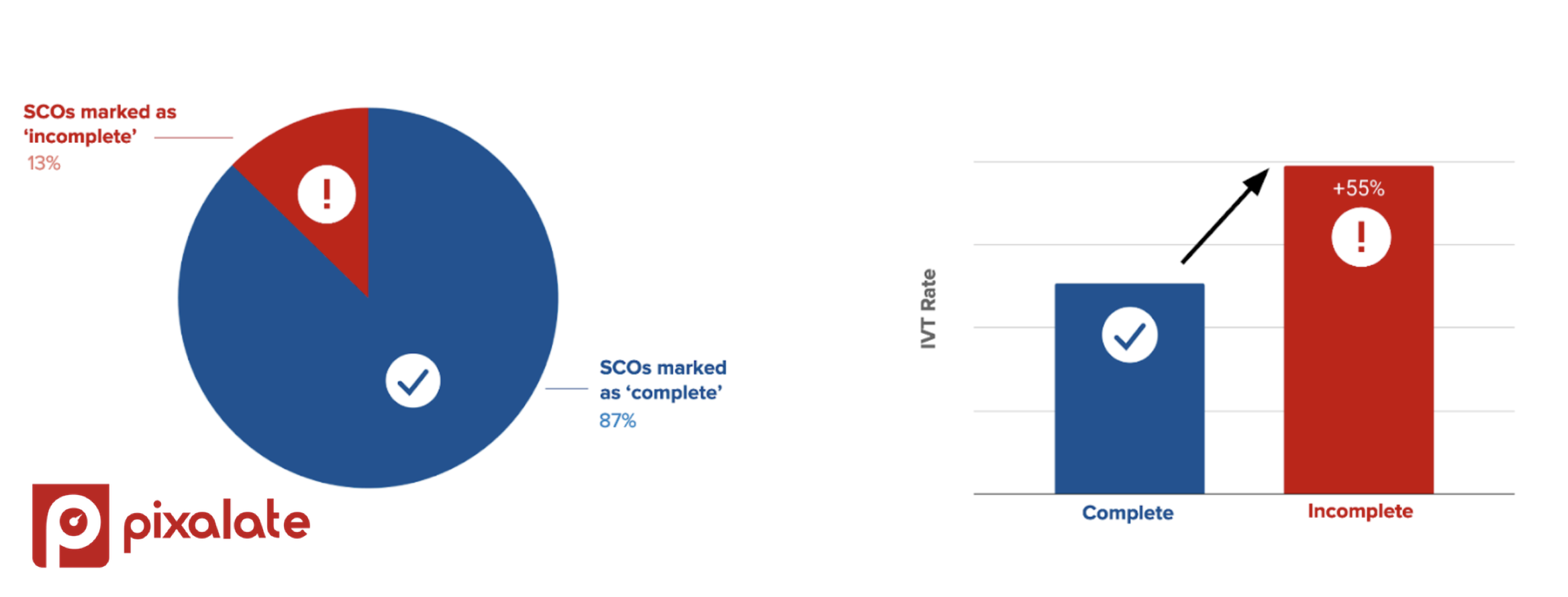
Analysis of the OpenRTB Supply Chain Object finds 55% higher Invalid Traffic (IVT) for SCOs marked as incomplete
LONDON, April 19, 2023 -- Pixalate, the market-leading fraud protection, privacy, and compliance analytics platform for Connected TV (CTV) and Mobile Advertising, today released the first Supply Path Optimization Trends Report for Q1 2023 to analyze the OpenRTB Supply Chain Object (SCO) in open programmatic advertising transactions.
The OpenRTB Supply Chain Object is a data structure that provides transparency and visibility into the programmatic advertising supply chain. Inspection of the SCO reveals the intermediaries involved in a programmatic advertising transaction, allowing for optimization of the supply path. The report provides valuable insights into the current state of supply chains in the programmatic advertising industry.

To download the Supply Path Optimizations Trends Q1 2023 Report, click here.
About Pixalate
Pixalate is the market-leading fraud protection, privacy, and compliance analytics platform for Connected TV (CTV) and Mobile Advertising. We work 24/7 to guard your reputation and grow your media value. Pixalate offers the only system of coordinated solutions across display, app, video, and CTV for better detection and elimination of ad fraud. Pixalate is an MRC-accredited service for the detection and filtration of sophisticated invalid traffic (SIVT) across desktop and mobile web, mobile in-app, and CTV advertising. www.pixalate.com
Disclaimer
The content of this press release, and the Q1 2023 Supply Path Optimization Trends Report (the "Report"), reflect Pixalate's opinions with respect to factors that Pixalate believes can be useful to the digital media industry. Pixalate’s opinions are just that, opinions, which means that they are neither facts nor guarantees. Pixalate is sharing this data not to impugn the standing or reputation of any entity, person or app, but, instead, to report findings and trends pertaining to programmatic advertising activity across CTV apps in the time period studied.
*By entering your email address and clicking Subscribe, you are agreeing to our Terms of Use and Privacy Policy.
These Stories on Mobile
*By entering your email address and clicking Subscribe, you are agreeing to our Terms of Use and Privacy Policy.

Disclaimer: The content of this page reflects Pixalate’s opinions with respect to the factors that Pixalate believes can be useful to the digital media industry. Any proprietary data shared is grounded in Pixalate’s proprietary technology and analytics, which Pixalate is continuously evaluating and updating. Any references to outside sources should not be construed as endorsements. Pixalate’s opinions are just that - opinion, not facts or guarantees.
Per the MRC, “'Fraud' is not intended to represent fraud as defined in various laws, statutes and ordinances or as conventionally used in U.S. Court or other legal proceedings, but rather a custom definition strictly for advertising measurement purposes. Also per the MRC, “‘Invalid Traffic’ is defined generally as traffic that does not meet certain ad serving quality or completeness criteria, or otherwise does not represent legitimate ad traffic that should be included in measurement counts. Among the reasons why ad traffic may be deemed invalid is it is a result of non-human traffic (spiders, bots, etc.), or activity designed to produce fraudulent traffic.”

